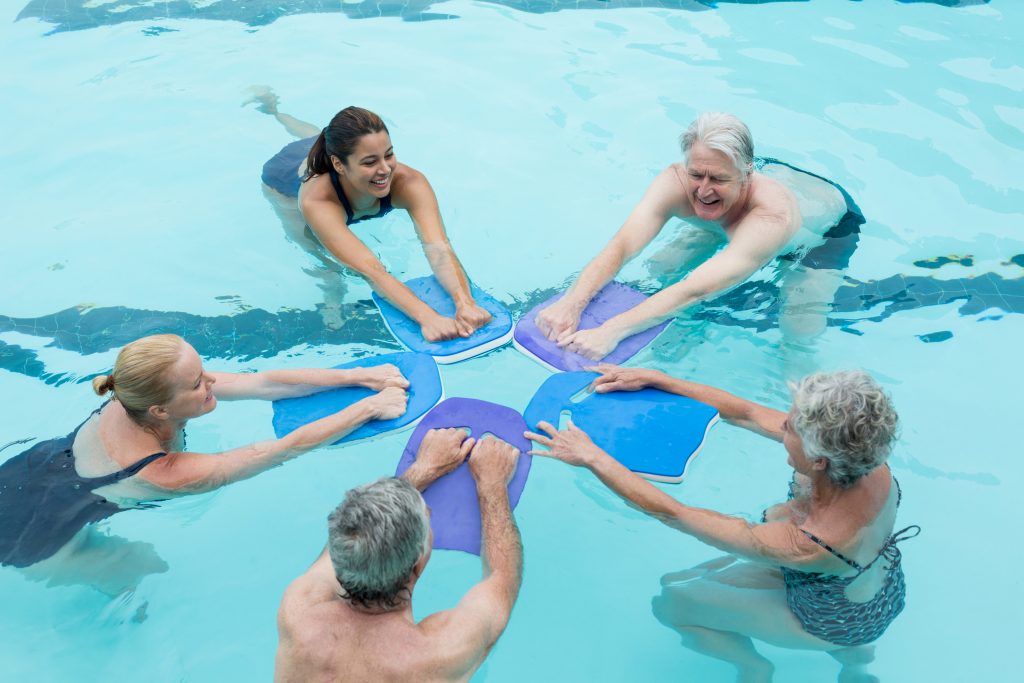Blog
Aquatic Therapy and Pain Relief
Many SCI people live with chronic pain and it can have a debilitating impact on all aspects of life. While medication is often used to manage pain levels, aquatic therapy provides an alternative approach to alleviate pain and some of its causes.
The benefits of warm water therapy can be traced back thousands of years. In Ancient Egypt, thermal baths and hot air caverns were used to treat a wide range of ailments. Moving forward to Ancient Greece, the father of medicine, Hippocrates, famously said: “Give me the power to produce fever, and I will cure all disease.”
Modern-day approach The Aquatic Therapy Association of Chartered Physiotherapists (ATACP) defines aquatic physiotherapy as:
“A therapy programme utilising the properties of water, designed by a suitably qualified physiotherapist specifically for an individual to improve function, carried out by appropriately trained personnel, ideally in a purpose-built, and suitably heated hydrotherapy pool” (ATACP, 2008).
Aquatic therapy is a physiotherapy technique often used to help people manage chronic pain and its symptoms. It does so in several ways:
1 Warmth
Hydrotherapy pools are usually heated to around 34 degrees. The heat stimulates thermoreceptor nerves in the body, which block pain signals to the brain.In addition to pain relief, the warmth stimulates circulation, bringing oxygen and nutrients to cells. It relaxes muscles and soft tissue, increasing range of movement when stretched and decreasing tone and spasms.
2 Pressure-relieving
Humans are naturally buoyant in water and as we float the weight and pressure on our joints is relieved. For people who use a wheelchair, floating in a pool also provides pressure relief for the skin and may give a sense of freedom.
3 Muscle strength
Some pains are caused by musculoskeletal conditions. Improving muscle strength helps to stabilise joints, preventing weakness and pain. The properties of the water can be used to assist or resist movement, therefore contributing to improved muscle strength. As you are exercising in a different position, free from contact with wheelchairs or beds, you can exercise muscles in a different range more easily to land-based strengthening exercises.
4 Reducing swelling
The pressure of the water can help reduce any oedema in limbs. An assessment with a physiotherapist will determine if a course of aquatic therapy will benefit you. It is sometimes available on the NHS and depending on the structure in your area, you could ask your GP for a referral or you might be able to self-refer to your local NHS physiotherapy department.
Alternatively, you could pay for private aquatic therapy sessions. Should you choose to do so, ensure that the physiotherapist is registered with the Health Professionals Council. Ideally, they would be a member of the Chartered Society of Physiotherapy (CSP) and members of the ATACP.
You may find that you can achieve the benefits of some pain relief by just being in a warm water environment and if so you can consider using a bath or jacuzzi if accessible.
Benefits of swimming
If you do not require aquatic therapy but enjoy being in the water, swimming also provides a range of benefits and is a great way to unwind. If you’d like to take swimming more seriously, why not get involved with your local Disability Swimming Hub Club? The clubs work in partnership with Swim England to offer training and advice to disabled swimmers. They offer swimming
assessments at local pools to identify development opportunities for potential aquatic athletes.
Whether you would like to take up swimming as a hobby or as a competitive sport, it offers a range of wellbeing benefits:
- It’s a good form of cardiovascular exercise
- It burns calories and helps with weight loss
- It promotes flexibility of limbs/joints
- The water supports the weight of your body, giving you a sense of freedom that other sports can’t offer
- Exercise releases endorphins – receptors in the brain that relieve stress and pain
- It relieves anxiety and depression
- It’s sociable and opens up the opportunity to meet new people.
Further Information
For more information about Disability Swimming Hub Clubs and to find your nearest accessible swimming pool, visit www.swimming.org
